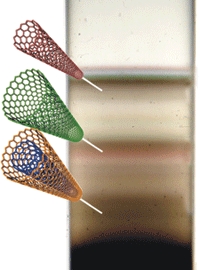Dec 18 2008
Double-walled carbon nanotubes (DWNTs) can be separated from mixtures of single- (SWNTs) and multiwalled nanotubes (MWNTs) by using a centrifugation method recently developed at Northwestern University (Nat. Nanotechnol., DOI: 10.1038/nnano.2008.364).
 BANDING TOGETHER Mixtures containing large- and small-diameter SWNTs, DWNTs, and MWNTs separate by density in an ultracentrifuge.
BANDING TOGETHER Mixtures containing large- and small-diameter SWNTs, DWNTs, and MWNTs separate by density in an ultracentrifuge.
Today's nanotube synthesis methods yield mixtures containing many types of tubes. SWNTs can be removed from the mixtures via high-temperature oxidation, but that degrades the electrical and optical properties of DWNTs and does not remove MWNTs.
Now, a Northwestern team has shown that by treating the tubes with a surfactant and suspending them in a fluid with a density gradient, the mixtures can be separated into their components by ultracentrifugation. The researchers used microscopy and spectroscopy to confirm the technique's ability to faithfully separate DWNTs.
DWNTs are ideal systems for studying interwall interactions that influence the properties of nanotubes with two or more walls, says Mark C. Hersam, the professor of chemistry and materials science who conducted the study with graduate student Alexander A. Green. In addition, DWNTs have properties that lie between those of SWNTs and MWNTs, making them potentially useful for a range of specific applications. For example, compared with SWNTs, DWNTs have shown enhanced performance in field-effect transistors and improved resolution in scanning-probe microscopy.